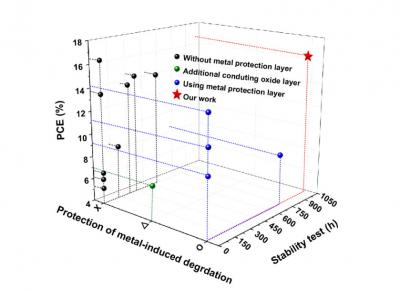A UNIST research team has developed an electrode that can significantly improve the stability of perovskite solar cells. UNIST announced that its research team developed 'flexible and transparent metal electrode-based perovskite solar cells with a graphene interlayer'.

The team suppressed interdiffusion and degradation using a graphene material with high impermeability, the team said. Team leader professor Hyesung Park commented that the research will greatly help not only solar cells but other perovskite-based flexible photoelectric devices such as LEDs and smart sensors.
The team demonstrated the critical role of graphene as a protection layer to prevent metal-induced degradation and halide diffusion between the electrode and perovskite layer; the performance of the flexible PSCs fabricated with GCEP was comparable to that of their rigid ITO-based counterparts and also exhibited outstanding mechanical and chemical stability. This work provides an effective strategy to design mechanically and chemically robust ITO-free metal-assisted TCE platforms in PSCs.

